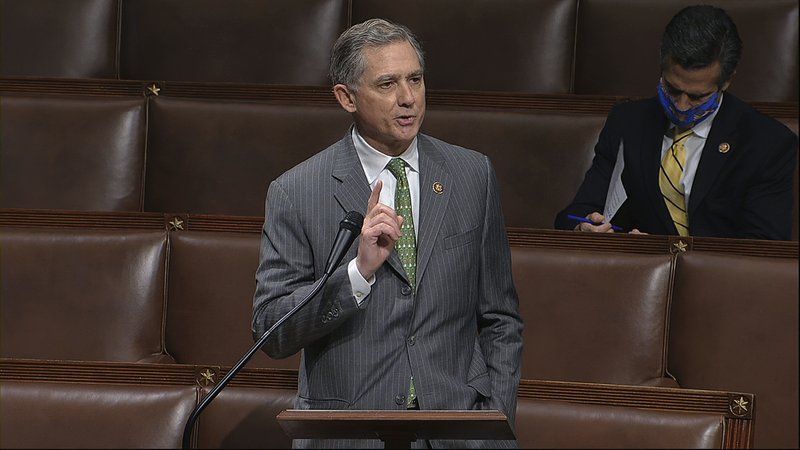U.S. Rep. French Hill's Democratic challenger, state Sen. Joyce Elliott of Little Rock, is criticizing the Little Rock Republican's use of government-funded mass communications, noting that it spiked with an election-related cutoff date approaching.
But Hill portrays his letters, postcards, e-newsletters and glossy mailers as legitimate constituent outreach.
The bipartisan Commission on Congressional Mailing Standards has signed off on 28 mass communications from Hill so far this year, including 14 since July 6, the House clerk's website shows.
U.S. Rep. Bruce Westerman, a Republican from Hot Springs, has had four items approved since Jan. 1, while U.S. Rep. Steve Womack, a Republican from Rogers, has had one.
In the Nov. 3 general election, Westerman's challengers are William H. Hanson, a Democrat, and Frank Gilbert, a Libertarian. Womack faces Celeste Williams, a Democrat, and Michael J. Kalagias, a Libertarian.
No approvals are listed for U.S. Rep. Rick Crawford, a Republican from Jonesboro, who is running unopposed.
Womack's lone approval involved a robocall inviting constituents to participate in a telephone town-hall session.
Westerman obtained permission for a robocall, two letters and a covid-19 information mailer.
Last year, Westerman led the House delegation with 39 approvals.
A congressman seeking another term isn't allowed to send taxpayer-funded messages to large numbers of constituents within 90 days of the election.
Decades ago, the prohibition applied to mailed communications. Since the advent of the internet and social media, the restrictions have expanded.
According to the Committee on House Administration, "no unsolicited mass communication or mailings, including mass e-mails, follow ups on legislative issues, and any digital advertisement regardless of cost ... may be distributed within 90 days immediately before the date of any primary or general election or caucus for any federal, state, or local office in which the Member is a candidate."
The blackout period for the Nov. 3 general election began Aug. 5.
Hill, in his third term representing the 2nd District, obtained his final approvals on Aug. 3.
Hill's communications from January to June were heavily focused on covid-19. The 14 communications since then cover a variety of topics, though the pandemic is frequently mentioned.
One, described as a "Postcard: Education Glossy Mailer," featured three photographs of the incumbent, including one of him addressing children in what appears to be a classroom. It touted his record on education issues and support for coronavirus relief aid. It was approved July 20.
Another, characterized as a "Postcard: Veterans Casework Glossy Mailer," featured four photos of Hill and a list of bills he's backed to boost the military and those who serve, including the Coronavirus Aid, Relief, and Economic Security Act. It came with a detachable postcard that veterans can use to request assistance.
Since July 6, Hill has also obtained permission to:
• Text and email constituents, inviting them to sign up for his e-newsletter.
• Post online advertisements focusing on education, jobs and the economy, veterans affairs and reliance on China for pandemic-related resources.
• Run a newspaper advertisement promoting covid-19 resources and other constituent services.
• Send a letter to Central Arkansans highlighting his stances on abortion and religious liberty.
The House website showed which pieces of mass communication were approved. It doesn't show how many people received the messages or the cost to taxpayers.
The flurry of government-funded messages followed a fundraising quarter in which Elliott's contributions outpaced those taken in by the Hill campaign.
Elliott reported net contributions of $600,225 between April 1 and June 30; Hill raised $271,336 during the same period, according to Federal Election Commission filings. Hill's campaign noted at the time that the fundraising report was filed that the campaign had decided "to pause fundraising efforts for nearly two months as a result of the coronavirus pandemic."
While Hill's communications were authorized, they're still troublesome, Elliott said in an interview.
"It surely seems to be abuse of this privilege of taxpayer money to help his reelection," she said. "When we ought to be concentrating on the coronavirus relief, he's sending out these messages and sticking taxpayers with the bill. That strikes me as highly, highly unusual."
In a written statement, Hill said he has an obligation "to communicate regularly with central Arkansans."
"This has been especially important during the current COVID-19 crisis, which is why, since March, I have sent more than six million emails, letters, mailers, and telephone town hall invitations containing important information about how to protect Arkansas families' health, and how to access the critical financial support programs I supported," he said.
Since January 2015, when he first took office, Hill has sent "upwards of 15 million emails, letters, mailers, and telephone town hall invitations to Central Arkansans," informing them about his work and the services his office makes available, he said.
The 2nd Congressional District's population is roughly 750,000.

